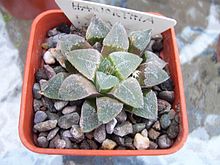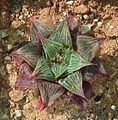Haworthia pygmaea
| Haworthia pygmaea | |
|---|---|

| |
| Haworthia pygmaea | |
| Scientific classification | |
| Kingdom: | Plantae |
| Clade: | Tracheophytes |
| Clade: | Angiosperms |
| Clade: | Monocots |
| Order: | Asparagales |
| Family: | Asphodelaceae |
| Subfamily: | Asphodeloideae |
| Genus: | Haworthia |
| Species: | H. pygmaea
|
| Binomial name | |
| Haworthia pygmaea | |
Haworthia pygmaea is a species of the genus Haworthia in the family Asphodelaceae, endemic to the Mossel Bay area of the Western Cape, South Africa.
Description
This species can be distinguished from its relatives, by its flat leaf ends (not convex like Haworthia emelyae) which have more rounded tips, and a grey colour.
Some individuals have leaves with a surface that is scabrous (rough) or papillate (bearing minute, nipple-shaped protuberances). These papillate forms have become especially popular in cultivation.
-
Detail of the distinctive scabrid/papillate leaf-surface of this species
-
The smoother "argenteo-maculosa" ("silver-spots") variety of Haworthia pygmaea
-
The "acuminata" ("pointed") variety of Haworthia pygmaea, with sharper pointed leaves
Relatives
This species is one of the "retuse" species of Haworthia, meaning that it usually grows sunken beneath the ground with its flattened leaves only showing on the surface. Its rosette of succulent leaves are turned back ("retuse") so as to provide a flat and level face, on the surface of the ground. In this form, it is similar to other retuse haworthias (e.g. Haworthia retusa, Haworthia bayeri, Haworthia springbokvlakensis, Haworthia mirabilis, Haworthia emelyae and Haworthia magnifica).
References
- ^ "Haworthia pygmaea", World Checklist of Selected Plant Families, Royal Botanic Gardens, Kew, retrieved 2016-02-02



